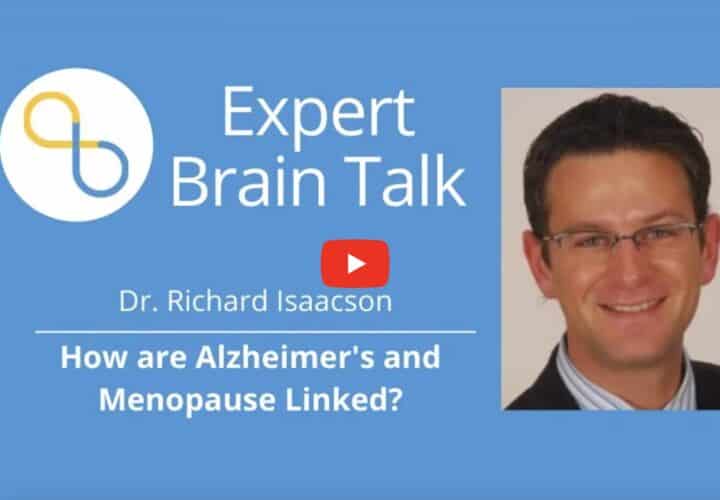There is notable overlap between the cognitive changes triggered by menopause, sometimes called “menopause brain,” and changes associated with dementia. But researchers say simple shifts to activity, sleep, and diet can help lessen the effects on menopause on the brain.
The signs of menopause can be subtle, and easy to attribute to other causes. That hazy, discombobulated feeling — the forgetfulness, the trouble staying focused — that many people experience could also be caused by anxiety or stress. The fatigue could be caused by physical activity. The irritability, premenstrual syndrome.
Those cognitive symptoms that can accompany menopause — a sense of a brain fog often referred to as “menopause brain” — might be particularly alarming for those who carry the risk factors for Alzheimer’s or other dementias, given that the symptoms of menopause brain tend to resemble early-onset dementia.
The good news: Far more often than not, the cause of this brain fog is menopause, and there’s plenty you can do to mitigate it. Research points to several lifestyle changes that can ease or even reverse these effects and help clear the haze.
1. Confirm the Cause
First, try not to make assumptions or Google your way to a diagnosis: Confirm the cause of your symptoms with an expert.
For anyone experiencing persistent brain fog, changes in mood or energy level, or hot flashes, it’s worth scheduling an appointment with your doctor to see what’s up.
It is worth mentioning that set of symptoms shared by “menopause brain” and early-onset dementia is so similar that early-onset has been known to be flippantly mis-diagnosed as menopause in people of menopause age, so if symptoms do persist, consider getting a second opinion.
That said, any number of things could be causing symptoms and for individuals 40 years old and older who can experience menopause, and the presence of menopause will be the first thing a doctor will confirm. Determining that a patient is indeed experiencing menopause will help both rule out other possible causes and determine how best to combat the symptoms.
2. Move Your Body
Regular exercise can have a tremendous influence on our physical and mental health, especially when it comes to the brain. Studies show that physical activity increases blood flow throughout the body, including the brain, promoting cardiovascular health. It can slow the aging process and improve memory by boosting the immune system and helping reduce inflammation. Studies also indicate that exercise prevents loss of brain volume — something that can cause decreased cognitive function. Some research takes that even further, suggesting exercise can even increase brain volume after six months of regular activity.
Beyond these physical benefits linked to brain health, exercise can also improve mood and decrease irritability — two common symptoms of menopause. For this reason, to combat menopause brain, doctors recommend doing whatever physical activity fits your abilities, schedule, and environment.
3. Exercise Your Mind
Even though physical exercise does, in its own way, exercise your brain to help lessen the cognitive effects of menopause, it’s just as important to stimulate your mind intellectually. Working out your brain helps build new synapses, which is where one neuron meets another to communicate. These connections build up a person’s cognitive reserve, the tool your brain uses to switch gears and react off the cuff, which decreases with age.
So how does one build new connections in their brain? Socializing flexes these muscles: studies show interacting with another person makes the brain move and think differently compared to when you’re on your own. Similarly, research suggests that reading stimulates the mind and helps improve memory, as do games. Studies have found that jigsaw puzzles, word games like crosswords and searches, board games, and even video games may improve brain function, processing speed, and memory. These games don’t have to take a lot of time out of your day and can even help with socializing. Instead of sitting down to watch television or scroll through social media, pick up a book or try a puzzle instead.
Can Hormone Replacement Therapy Prevent Menopause Brain Changes?
4. Take Stock of Your Sleep Quality
There’s a reason that a poor night’s sleep leaves a person feeling groggy, irritable and just not totally with it the next day. Research shows that “limited deep sleep is associated with a 40-percent decline in memory performance.”
So, just like the body, the brain needs ample rest to recover from each day’s work. Some sleep specialists believe that while we’re in a deep sleep, our brains are essentially filing away all the connections and associations from that day, leaving what’s most vital to our everyday survival at the top. A lack of deep sleep makes it much harder for your brain to perform this cleaning process. This also supports the idea that disrupted sleep leads to forgetfulness, because the brain doesn’t have enough time to transfer short-term memories into its bank of long-term memories.
To get a better night’s sleep, reducing screen time before bed, avoiding caffeine, sugar, and alcohol later in the day, and building a comfortable sleep environment are all good starting points. Not to mention, physical and mental exercise will help tire you out enough to fall asleep each night.
5. Focus on a Healthy Diet
We mentioned above that inflammation can impair cognitive function and diet plays a critical role in reducing inflammation. Unsurprisingly, eating healthier foods like the leafy greens, berries, nuts, whole grains, and fish found in a mediterranean diet support brain health. But it’s just as important to eat a variety of foods and in the right quantities. Studies have found that eating foods like processed meats or those high in starch aren’t totally detrimental when eaten with healthier options. For instance, combining pasta with a plate of vegetables and seafood leads to better brain health than when eaten with just cheese and high-fat ground beef.
This idea of combining smaller portions of what is deemed “unhealthy” with larger quantities of fruits, vegetables, and whole grains will also help ease people into a healthier way of eating by not removing all the things they enjoy at once.
Exercising the body and brain, sleeping well, and eating a healthy diet aren’t the only things a person can do to combat the effects of menopause brain, but they’re a great place to start — and some of the easiest to do without the constant help of a doctor. The best part: science says incorporating these changes into your lifestyle could have a lasting positive effect on your cognitive health in later phases of life.
UPDATED 11 March 11:44 a.m. – This 2021 article was updated with new resource links to give our readers more context about the science behind menopause and brain fog.



